
Do you have a system in place for winning consulting projects? Do you have a marketing strategy — or do you rely on hope to get more clients? If you’re a consultant, you’re in the business of marketing. To get consulting clients, you need to generate conversations with the right prospects.
Marketing is how you generate these conversations. Without marketing, you don’t have a consulting business.
At Consulting Success, helpings consultants master their marketing to get more clients is our forté. We study and help you apply what works — and avoid what doesn’t. And in this post, we’re sharing what we learned from a survey that we sent to over 34,000 consultants on our list.
If you want to learn what’s working (and what’s not) for consultants in 2019 for getting more clients, read on.
Summary Of Our Key Findings On Marketing For Consultants in 2019
1. Referrals are king. 37% of consultants listed “referrals” as their primary means of generating new business — 20% higher than the next most selected answer: Networking & Events (18%).
2. More consultants struggle with marketing (32% say they struggle with marketing) more than they struggle with sales (23% say they struggle with sales). 28% say the struggle with both equally — and only 17% say they don’t struggle with either.
3. Investing more in your marketing correlates to a higher income. Over 50% of consultants investing $5K+ in their marketing are earning more than $150K per year.
4. Consultants dislike making phone calls. 41% of them claim making phone calls as their most disliked marketing method. However, 7% of consultants say that making phone calls makes them the most money — the third highest income-generating marketing method for the consultants we polled.
5. Consultants win a large percentage of their business by referrals. 22% of consultants win 95%+ of their business via referral — and over 50% of consultants win 60%+ of their business via referral.
6. Marketing frequency correlates to less of a reliance on referrals. Consultants who market their business daily rely less on referrals. Consultants who market their business only when they need a new client rely heavily on referrals.
7. We see a positive correlation between marketing frequency and the number of clients. Consultants who work with 1-3 clients per year market their business less (only 25% market their business daily) than consultants who work with 6+ clients per year (38% market their business daily).
8. Consultants who earn $150K-$1M+ rely far less on referrals. 28% of them listed 20-40% of their business coming from referrals — the most chosen answer for consultants earning $150K-$1M+.
9. Years of experience is highly correlated to income. The more experienced consultants (15+ years of experience) are earning the most annual income.
10. 70% of consultants polled have no employees — but 41% of consultants polled work with 1-3 contractors per year (more so than those who work with none at 36%).
11. Women struggle with marketing and sales equally (38% of women consultants polled say so). Men struggle more with marketing than sales (32% say they struggle with marketing the most). Women are also much more reliant on referrals (of women consultants polled, 36% of them win 95% of their business via referral compared to 18% for men).
12. 34% of consultants listed “Realize my potential” as the #1 reason they started their own consulting business. “Be my own boss” was the second most popular answer at 26%. “Realize my potential” was the most popular answer for men, and “Be my own boss” was the most popular answer for women.
Below, you’ll find a comprehensive look at the survey data.
--
Consulting Marketing Statistics
What do you struggle more with?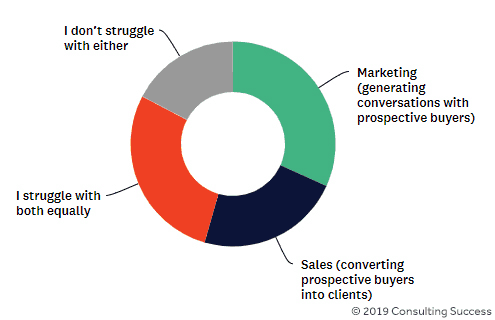
Why do we decide to put out a study on marketing for consultants? Because marketing and sales are a challenge for consultants. And the data backs that up. 32% of consultants say they struggle most with their marketing (generating conversations with prospective buyers). 23% struggle more with sales (converting prospects into clients).
And 28% struggle with both equally. Only 17% of consultants claim they don’t struggle with either.
What’s the difference between consultants who struggle with their marketing and those who don’t?
- 39% of consultants who don’t struggle with marketing are actually marketing their business daily. We propose that the more you market your business, the less likely you are to struggle with it.
- Consultants who don’t struggle with marketing rely less on referrals. If you don’t know how to get clients without referrals, chances are you’re struggling with your marketing.
- Consultants who don’t struggle with marketing use more contractors (52% use 1-3 contractors per year) than those who do struggle with marketing (only 29% use 1-3 contractors). This might suggest that if you don’t have contractors to help you run various parts of your business, you don’t have the time to market your business.
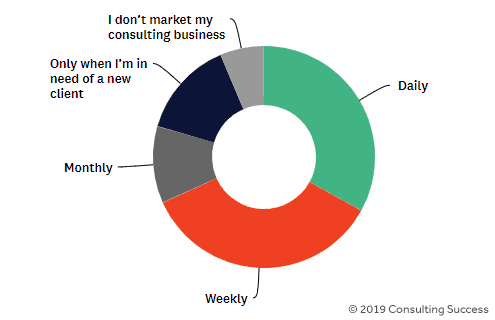 Most consultants we poll market their business weekly (35%). 33% of consultants market their business daily. 11% of consultants market their business monthly. 14% of consultants market their business only when they need a new client — and 6% don’t market their business at all.
Most consultants we poll market their business weekly (35%). 33% of consultants market their business daily. 11% of consultants market their business monthly. 14% of consultants market their business only when they need a new client — and 6% don’t market their business at all.
Consultants who market their business daily do not rely on referrals nearly as much. For consultants who only market their business when they need a new client, over 50% of them get most of their business from referrals.
Even if you’re confident in your ability to generate referrals, marketing only when you need clients isn’t the best approach. We recommend developing a marketing strategy so you can be proactive in acquiring new clients. You should build a predictable and reliable marketing system.
How much money do you spend on marketing your consulting business each YEAR?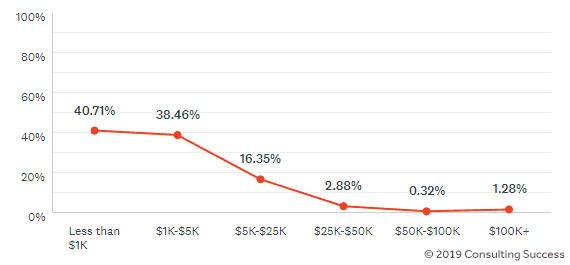 Consultants don’t invest much in their marketing. Those who do invest tend to have higher incomes. 40% invest less than $1000 in their marketing each year. 38% invest $1000-$5000. 20% invest $5000+.
Consultants don’t invest much in their marketing. Those who do invest tend to have higher incomes. 40% invest less than $1000 in their marketing each year. 38% invest $1000-$5000. 20% invest $5000+.
Marketing is not an expense — it’s an investment. When you invest in your marketing (the right way), you should see a return on your investment. Marketing’s job is to generate conversations with prospective buyers so you can get more clients and make more money.
We observed that the highest-earning consultants tend to invest more in their marketing — over 50% of consultants who invest $5K-$25K in their marketing are making more than $150K per year — with 30% making over $300K per year.
What percentage of your business comes from referrals?
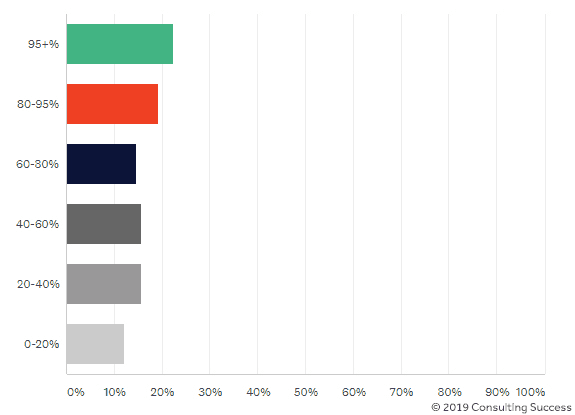
Marketing is difficult for consultants in a competitive marketplace — and that’s why consultants rely heavily on referrals. Over 55% of consultants get 60% of their new business from referrals.
This can mean that they have become very good at referral marketing or networking — but it can also mean they’re having trouble generating new business outside of immediate relationships.
Referrals will always be a great source of your new business. But, there’s always a possibility that your referral well runs dry. We advise consultants not to put all of their eggs in one basket and learn to attract clients through other means.
Consultant Marketing Preferences – What type of marketing do you enjoy the most?
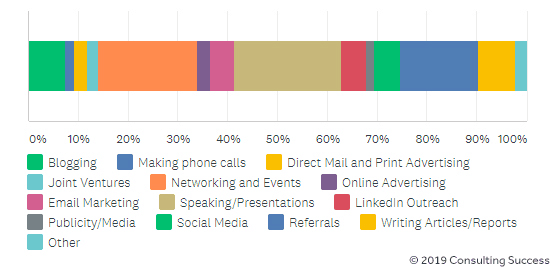
Speaking looks to be the most popular marketing method for consultants at 21%. Networking and events (20%), referrals (16%), and writing (7%) were the next most popular marketing methods.
These methods provide a nice mix of relationship-building and demonstrating your expertise — two critical aspects of marketing for consultants.
What type of marketing do you dislike the most?
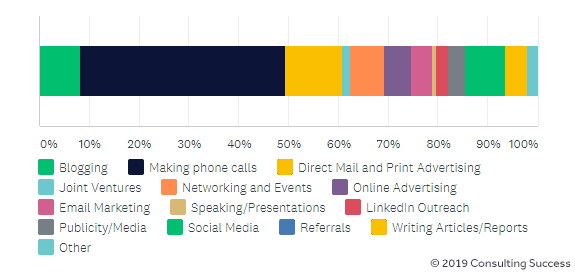 The data is clear — consultants don’t like making phone calls.
The data is clear — consultants don’t like making phone calls.
41% of consultants listed making phone calls as their most disliked form of marketing. The next most disliked was direct mail and print advertising at 12%. There was an even spread among the rest of the methods.
Why do consultants dislike picking up the phone? It’s uncomfortable and time-consuming. But, there are ways to make it more effective.
What type of marketing do you spend the most TIME on?
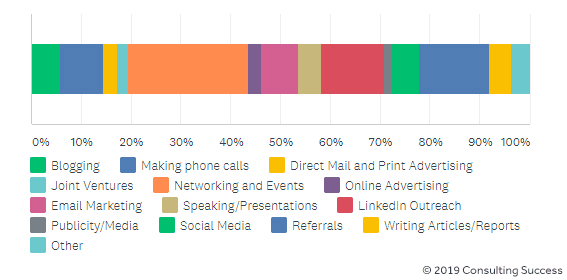 Consultants spend their time on a variety of different marketing methods. 24% of consultants chose “Networking & Events” as the marketing method they spend the most time on.
Consultants spend their time on a variety of different marketing methods. 24% of consultants chose “Networking & Events” as the marketing method they spend the most time on.
Referrals came in second at 14%. The third was LinkedIn outreach at 12%.
Which of the below has made your business the most MONEY?
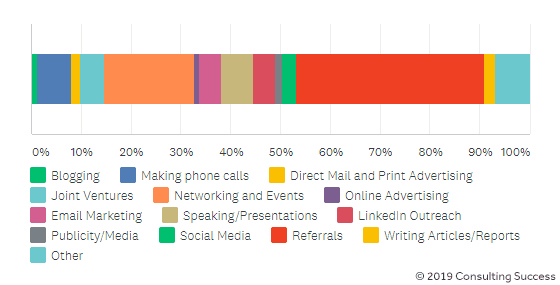 Referrals make consultants the most money — with 38% of consultants choosing referrals as their highest income earning marketing method.
Referrals make consultants the most money — with 38% of consultants choosing referrals as their highest income earning marketing method.
Next was networking and events at 18%. In third was making phone calls at 7%.
What area of your marketing are you planning to improve/work on most in 2019?
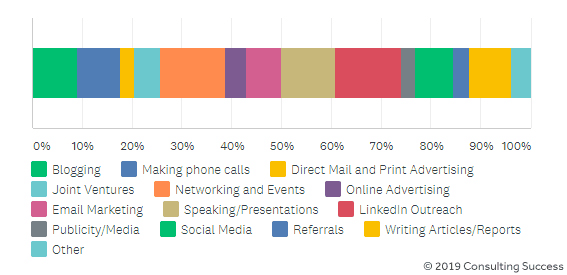 Consultants are interested in improving many areas of their marketing in 2019.
Consultants are interested in improving many areas of their marketing in 2019.
The most popular answers were Networking & Events and LinkedIn Outreach at 13% each. Speaking, blogging, writing, and email marketing are also drawing a lot of interest.
Very few consultants are looking into direct mail or traditional media to market their business. With the rise of social and new media, these more traditional methods have fallen out of favor – that doesn’t mean they can’t work well. However, there are still effective ways to market your business via traditional media.
Consulting Business Statistics – What is your annual income from consulting?
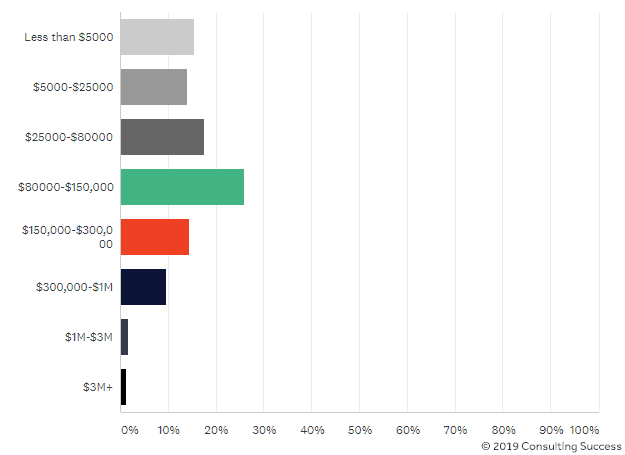
26% of the consultants who took our survey make between $80K-$150K. The next most chosen answer was $25K-$80K (17%).
14% make between $150K-$300K. 14% make $5000-$25K. And 13% make $300K+.
So, what are the consultants who are making more than $300K doing differently with their marketing?
- They market their business daily.
- They invest more in their marketing.
- They rely far less on referrals.
- They spend more time reaching out to potential clients on LinkedIn.
- They tend to earn more money from writing and blogging.
- They have more years of experience.
Ask yourself — if you’re not making over $300K per year, are you doing the 6 things above?
What is the #1 reason you became a consultant?
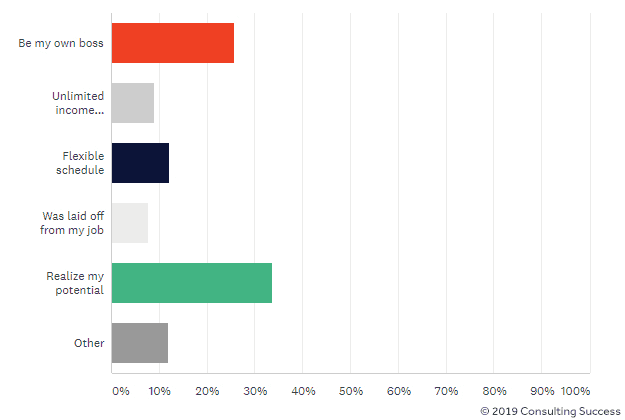 If you want to realize your potential or be your own boss, you’re in good company. 34% of consultants we polled listed “Realize my potential” as the #1 reason they become a consultant. 26% said chose “be my own boss.”
If you want to realize your potential or be your own boss, you’re in good company. 34% of consultants we polled listed “Realize my potential” as the #1 reason they become a consultant. 26% said chose “be my own boss.”
12% chose the flexible schedule, 9% said unlimited income, and 8% said they became a consultant because they were laid off. Consulting is a great business to start for all of these reasons.
How many years have you been a consultant?
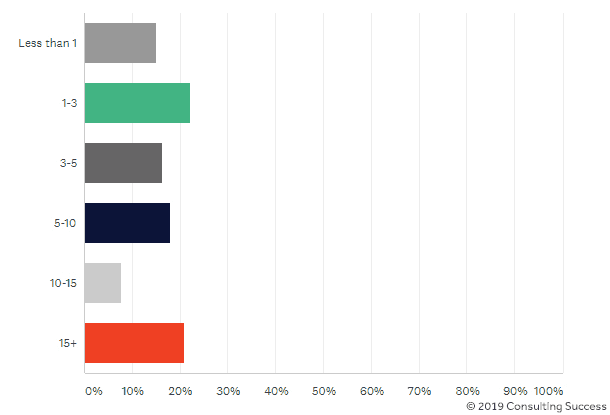
Consultants who took our poll have various degrees of experience. 22% of consultants have been a consultant for 1-3 years.
21% of consultants have been a consultant for 15+ years. The other answers came were 5-10 years (18%), 3-5 years (16%), and 10-15 years (8%).
15% of consultants are brand new — and have been consulting for less than 1 year. As you might imagine, we observed a correlation between years of experience and income.
The consultant with the highest income have the most years of experience. If you’re a new consultant, hang in there. As your experience grows, so will your income — provided that you’re continually increasing your value.
What type of consultant would you consider yourself?
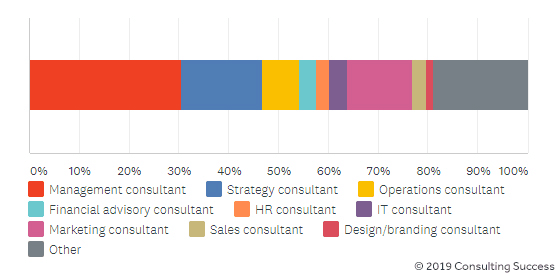
Our survey featured a diverse group of consultants. 30% are management consultants. 16% are strategy consultants, 13% are marketing consultants, and 7% are operations consultants.
Others included financial advisory consultants (4%), HR consultants (3%), IT consultants (4%), sales consultants (3%), and design consultants (1%). 19% selected other.
How many clients do consultants work with each year?
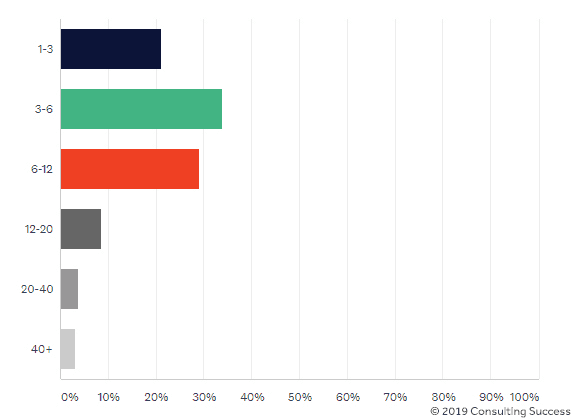 As for how many clients consultants work with each year, the most popular answer was 3-6 (34%). “6-12 clients” was the second most chosen answer (29%), and 1-3 was the third (21%).
As for how many clients consultants work with each year, the most popular answer was 3-6 (34%). “6-12 clients” was the second most chosen answer (29%), and 1-3 was the third (21%).
16% of consultants polled work with more than 12+ clients per year — suggesting they’re leveraging productized consulting to take on more clients and scale up.
How does the number of clients play in a firm’s marketing?
- Consultants who only work with 1-3 clients per year struggle with both marketing and sales equally (45%). We think that when you work with 1-3 clients per year, you might be in a dangerous position. You risk becoming reliant on one client as the sole source of income — and you risk becoming more of an employee than a consultant.
- Consultants who work with 1-3 clients per year market their business far less frequently. If you want more clients, try marketing your business daily — or at least weekly.
- There is a correlation between the number of clients and a reliance on referrals. The fewer clients a consultant works with each year, the more they seem to rely on referrals. If you’re relying on referrals too much, chances are you’re not marketing your consulting business effectively.
How many full-time employees do consultants have?
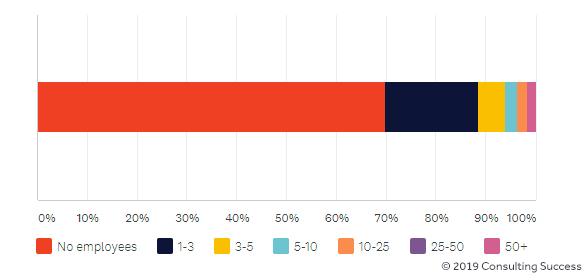
70% of consultants we polled have no employees and are independent consultants. 19% of consultants polled have 1-3 employees. 12% have more than 3 employees.
How many part-time employees or contractors do consultants work with each year?
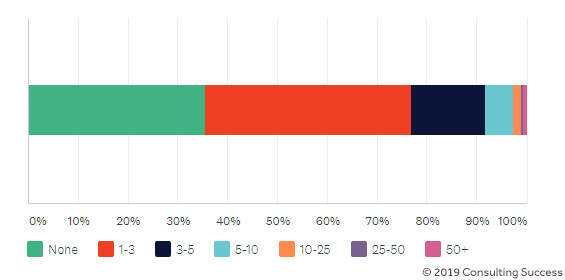
While 70% of the consultants we polled do not have any full-time employees, many consultants do work with contractors each year. 41% of consultants we polled use 1-3 contractors per year. 36% use none, and 23% use more than 3.
Contractors are a great way to scale up your business — without having to deal with the overhead that full-time employees bring.
Consulting Demographics – What is the average age of consultants?
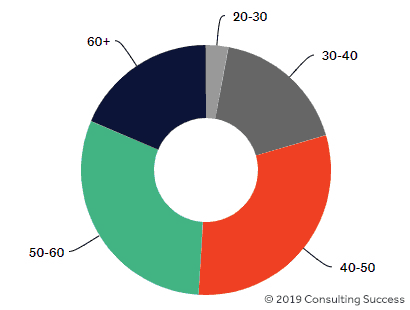
It’s never too late to start your consulting business. Over 60% of the consultants we polled are 40-60.
Nearly 20% are older than 60. 20% are 40 or younger.
How does marketing compare across different ages? Here’s what we found:
- The younger generation enjoys blogging more (22% chose blogging as their favorite marketing method).
- Making phone calls doesn’t become more enjoyable as you age — every age group listed making phone calls as their least favorite marketing method.
- Millennial consultants are making most of their money via Joint Ventures and Online Advertising — even more so than referrals. Consultants who are 30-40+ make most of their money via referral.
Where do consultants live?
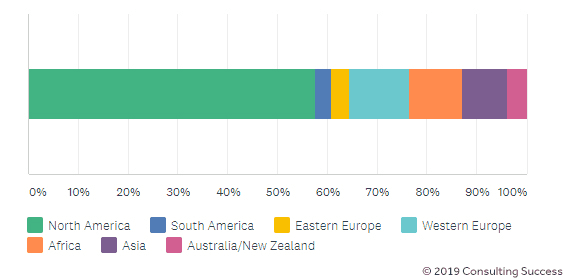
The majority of consultants polled in our survey live in North America at 57%. Western Europe (12%), Africa (11%), and Asia (9%) follow.
I am…
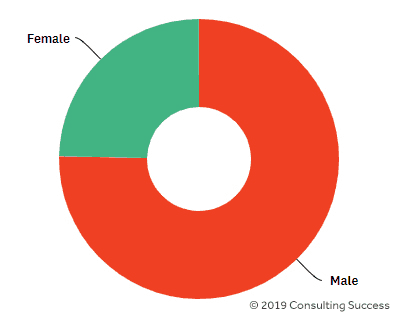
75% of the consultants polled in our survey are male, and the other 25% female.
We observed some interesting gender dynamics in consulting:
- 13% more female consultants listed networking and events as their favorite marketing method than men.
- Women struggle with marketing and sales equally (38% list that they struggle with both). Men, on the other hand, have more trouble with marketing (32% say they struggle with marketing more).
- Double the percentage of women (36%) win 95%+ of their business via referral than men (18%). When it comes to why they chose to become a consultant, “realize my potential” was the most popular answer for men (35%). For women, “Be my own boss” was the most popular answer (32%).
Past Study Comparison
So how does this year’s study compare to last year’s study?
In the 2018 study, referrals were the marketing method that consultants spent the most time on at 22%. In 2019, 24% of consultants listed networking and events as the marketing method they spend time on — with referrals dropping to 14%.
Referrals make consultants the most money in both 2018 and 2019. Consultants are investing similar amounts into their marketing in both years.
Consultants work with more clients per year in 2019 compared to 2018. Want to see the 2018 study in its entirety? We’ve archived the study for you to see here.
Marketing For Consultants Action Plan
Don’t just read the study and think “that’s neat” — we create these studies to help you take action. If you’re a new consultant and don’t know where to start with your marketing… Check out our article on starting a consulting business. It will help you build up your new consulting business the right way.
We’ve also recently launched the Momentum program if you want to follow a step-by-step system to generate consistent clients. If you’re an experienced consultant but aren’t happy with your pipeline of incoming projects…
Check out our article on 10 Proven Marketing Tactics for Consultants and Coaches — and make the habit of actually doing them!
If you are wondering how you can vastly improve your own marketing and sales process — and find more qualified clients who pay more for your expertise — we would be happy to chat with you. On our call, you’ll learn how your marketing process could be improved — at no cost to you.
Want to hear from women in consulting? Our podcast features thriving consultants like Dauwn Parker, Elizabeth Woolfe, Nancy Halpern, and many more.
If you’re working more like a contractor and want to get into the business of consulting, listen to our podcast with Doug Miller: Moving From Agency Work To Starting Your Own Consulting Business.
Conclusion
Now that you’ve seen the data, how does your consulting business stack up when it comes to marketing? Are you one of the many consultants who struggle with it?
Leave a comment below with your thoughts.
NOTE: We are using new software to power our surveys, and we can create filters to analyze the data using different segments. Let us know how you’d like us to analyze the data!
--
About the Author
Michael Zipursky is the CEO of Consulting Success® and Coach to Consultants. He has advised organizations like Financial Times, Dow Jones, RBC, Omron, Sumitomo and helped Panasonic launch new products into global markets, but more importantly, he’s helped over 300 consultants from around the world in over 50 industries add six and seven figures to their annual revenues. Over 34,000 consultants read his weekly consulting newsletter. Michael is also the author of the Amazon Best Sellers "The Elite Consulting Mind" and Consulting Success®,the book. You can get Michael’s Free Consulting Blueprint here.
A version of this guest blog was first posted here.



